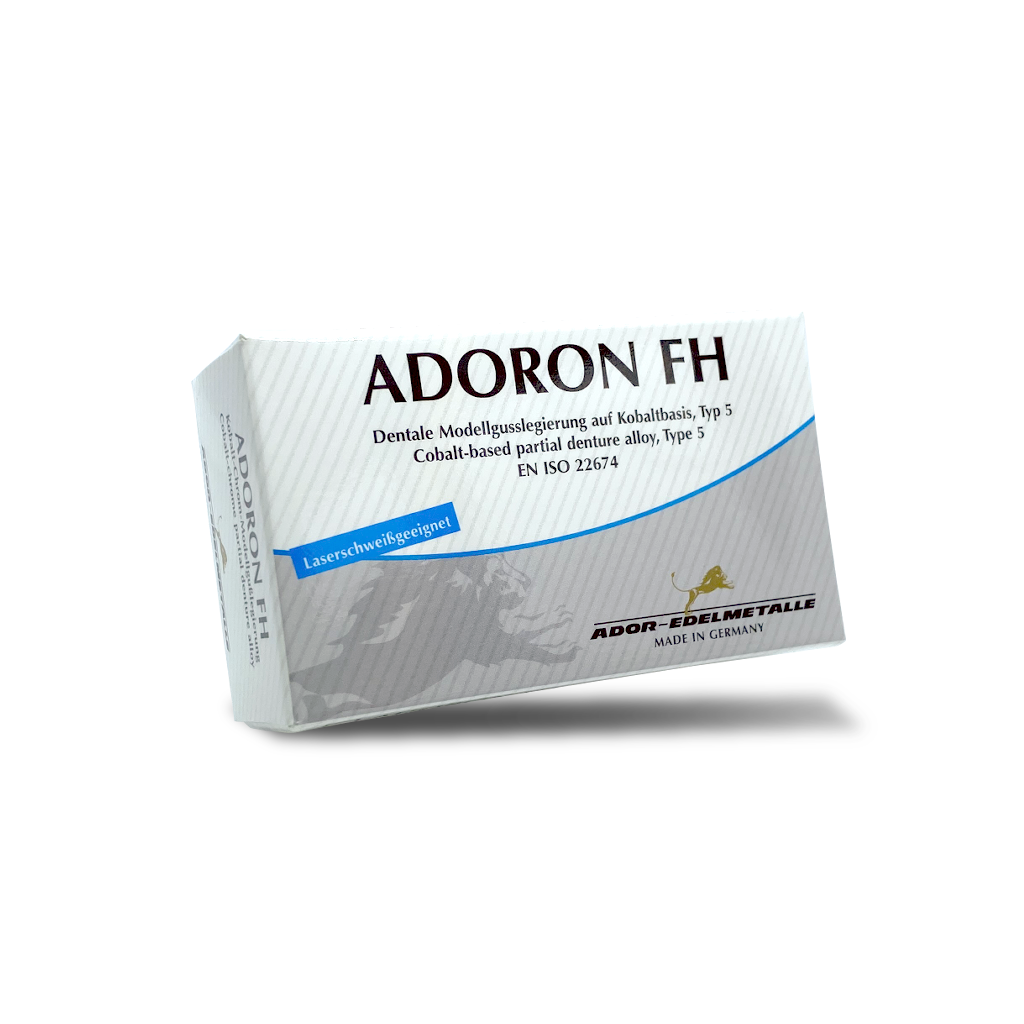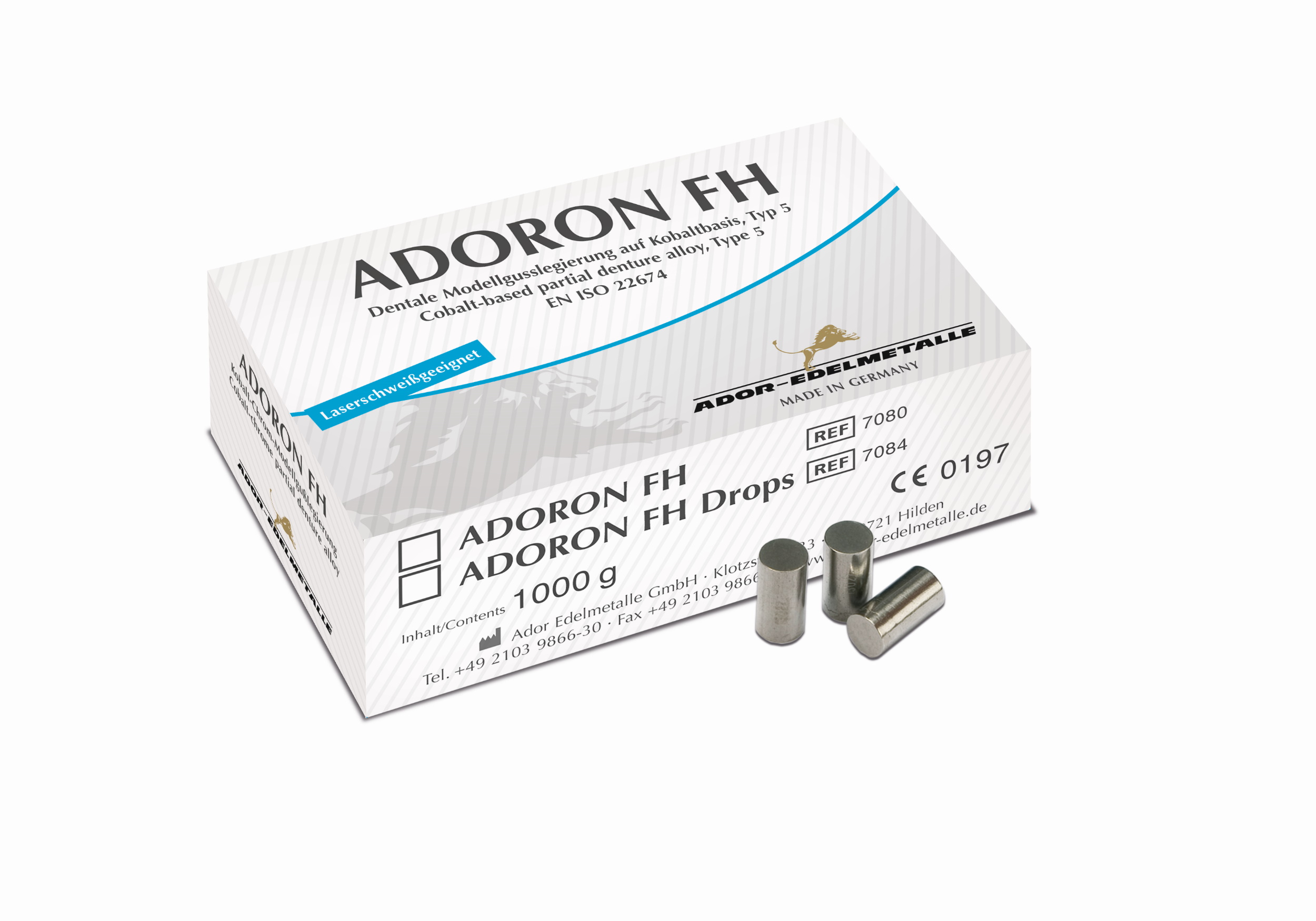ADORON FH
1000g
Spring-hard allround model casting alloy
159,90 € excl. VAT
| Title | Menge | Preis/Stück |
|---|---|---|
| NEM Modellgusslegierungen | 5 - 9 | 5% 151,91 € |
| NEM Modellgusslegierungen | 10 - 24 | 10% 143,91 € |
| NEM Modellgusslegierungen | 25 - 49 | 15% 135,92 € |
| NEM Modellgusslegierungen | 50 - 99 | 25% 119,93 € |
| Rabatte Legat NEM 35% | 1 - 999 | 35% 103,94 € |
Description
Spring-hard allround model casting alloy
| ADORON® FH is a dental extra hard model casting alloy on the cobalt basis. ADORON® FH is free of nickel, cadmium, beryllium and lead and, according to EN ISO 22674, corresponds to type 5 for applications where tool parts require a combination of high stiffness and yield strength, e.g. thin removable partial dentures, parts with thin cross-sections and clasps. | |||||||
| Composition wi | Technical specifications (normative index, cast condition: cast) | ||||||
| Co | % | 62,5 | Density ϱ | 8,2 | |||
| Cr | % | 30,0 | Vickers hardness | 375 | |||
| Mo | % | 5,1 | Melting interval TS - TL | 1.260-1.320 | |||
| Si | % | 1,0 | Casting temperature TCast | 1.440 | |||
| Mn | % | 1,0 | 0,2-% Yield strength Rp 0,2 | 620 | |||
| C, N, Nb, Fe | % | < 1 | Modulus of elasticity E GPa | 220 | |||
| Elongation at break A5 % | 4,5 | ||||||
| Processing recommendation | |||||||
| Modeling | |||||||
| Guide round wax profiles with Ø 3.5-4mm in the direction of flow of the melt, avoid sharp deflections. | |||||||
| Embedding and casting | |||||||
| Phosphate-bonded model casting embedding compounds are suitable. Preheating temperature is 950 - 1000°C depending on model and casting machine, for solid plates final temperature is 1050°C. Holding time at the final temperature is 45 - 60 minutes, depending on muffle size and filling degree of the furnace. Follow the manufacture’s operating instructions for the casting machine. Use separate ceramic crucibles for ADORON® FH to avoid contamination by other alloys. Clean crucible after each casting. Do not overheat the alloy. Casting can be started after all cylinders are completely melted and the melt becomes uniformly bright. Always melt with the flame in the reducing zone with circular movements above of the burner. Allow muffle to cool down to hand temperature and bed out without hitting the cone. | |||||||
| Finishing up of the cast | |||||||
| After bedding out:
1. Blast the framework surface in a stylus sandblaster with 100 µm or 250 µm aluminium oxide. 2. Separate the channels and work them out. 3. Electrolytic polishing shall be done with commercial electrolytes in polishing units for dental applications. Protect clasps and fitting parts against uncontrolled abrasion when polishing with covering varnish. |
|||||||
| Finishing up
After finishing and fitting smoothen the framework with a rubber polisher. |
|||||||
| Soldering and welding
Soldering before firing with the ADORBOND® CC Lot and high-temperature flux. The width of the solder gap should be 0.05-0.2 mm. Laser welding with the ADORBOND® CC laser wire. |
|||||||
| Safety instructions
Metal dust is harmful to your health. Use suction when handling the powder, by finishing works and blasting. Hypersensitivity to the alloy components should be taken into account. In case of suspected intolerance with certain alloy components, the product should not be used. |
|||||||
| Warranty
These technical application recommendations are based on our own tests and experience and can therefore only be regarded as guidelines. The dentist or dental assistent himself is responsible for the correct application of the product. |
|||||||
Additional information
| Weight | 1048 g |
|---|---|
| Size | 1 kg, 100 g, 250 g, 500 g |
Only logged in customers who have purchased this product may leave a review.


Reviews
There are no reviews yet.